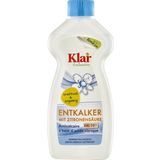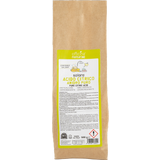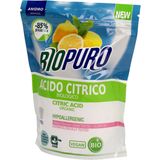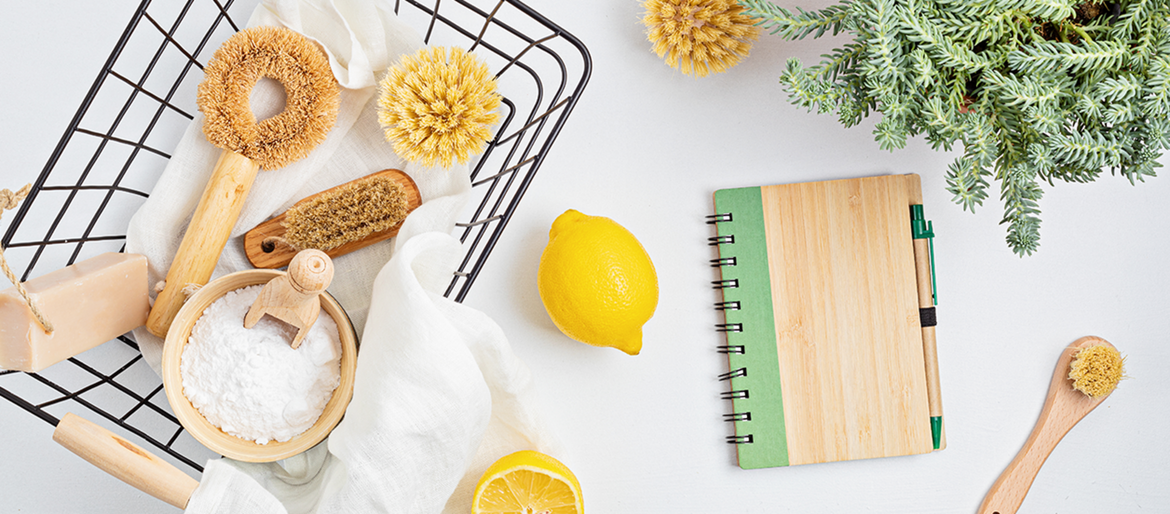Citric Acid - A Household Cleaning Champion
Awareness of a more environmentally friendly way of life has changed in people's minds, and not only when it comes to food, clothing or cosmetics. Cleaning agents are also being steered in a more responsible and gentle direction. Chemical cleaners are unhealthy and expensive and instead of struggling with a long list of ingredients, the proven household remedy, citric acid, offers a very simple and universal option for a wide variety of applications in and outside the household. The practical alternative is multifunctional, super effective and also a sustainable counterpart to conventional cleaners.
But what exactly is citric acid and what should you consider when using it?
Citric acid is one of the most widely used plant-based fruit acids and is a powdered solid that is water-soluble, colourless and biodegradable. More than 200 years ago, Carl Wilhelm Scheele isolated citric acid from a lemon, from which it derives its name. It is mainly found in apples, pears and berries, but also in some conifers and types of mushrooms. Even our body produces citric acid as an intermediate product of the carbon and fatty acid metabolism.
Frequent areas of application include foods in the form of flavouring agents or preservatives. But citric acid also unfolds its power in cleaning agents and is now a universally applicable, impressive and, above all, effective little helper.
But beware! The name precedes it, because the seemingly inconspicuous substance is still an acid. Therefore, be careful with the dosage and avoid eye contact!
If you have sensitive skin, we recommend wearing rubber gloves!
Practical tips for using citric acid in the home
1) Tough against limescale
We have all experienced those annoying white limescale marks on the showerhead and on faucets or the limescale that has already clumped in the kettle. Be it in the kitchen, in the bathroom or to remove rust - the talented citric acid works wonders everywhere and also leaves a fresh citrus scent.
And it's this easy:
- For coffee machines, kettles, etc.: Mix 3 tablespoons of citric acid with 1 litre of water and pour into the respective device. Heat to a maximum of lukewarm, otherwise the cleaning power will be impaired by the heat. So that your morning coffee doesn't taste like lemon, rinse the device again with water.
- For bathroom fittings & faucets: Prepare the water-acid solution (as described above), pour into a spray bottle and shake well. If you prefer a different scent, feel free to mix in a few drops of your favourite essential oil! Then spray on, leave to work for a short time, rinse with cold water and wipe dry.
- For dishwashers and washing machines: Put 7-8 tablespoons of citric acid directly into the empty appliance and select a medium-temperature rinse cycle (maximum 40 degrees).
Note: Citric acid can be used in many ways, but base metals such as aluminium are not acid-resistant and can therefore be damaged!
2) The inexpensive all-purpose cleaner
Have you ever turned away from cooking for one second and the pot overflows, the soup splatters in the microwave or the gravy boils over in the oven? No problem! Mix a tablespoon of citric acid in warm water, treat the dirty areas with the mixture and then rinse everything off with clear water.
- For stubborn dirt such as burnt-in pots or pans, bring the mixture to a boil, leave to work and rinse well.
- In the case of dirty ovens or microwaves, briefly heat the devices up to a maximum of 100 degrees after cleaning.
Limescale and residues on flowerpots or vases can also be cleaned very easily: put 3 spoonfuls of citric acid in a bucket of lukewarm water, leave the objects to work overnight and clean and rinse thoroughly the next morning.
3) A crystal clear matter
Together with alcohol and water, citric acid forms an excellent shine-enhancing rinse aid for the dishwasher, which at the same time counteracts the limescale deposits from hard water in the machine. To do this, dissolve 40 g of citric acid in 100 ml of warm water and add 150 ml of alcohol. The self-made rinse aid is ready and there are no more streaks and chalky glass rims!
4) The homemade stain remover
Even after washing, shirts and blouses often still have yellowish stains on the collar or in the armpits. Continue to feel comfortable in your absolute favourite clothes and make sweat and deodorant stains disappear with an effective treatment of citric acid water solution:
Soak the clothes for a few hours (10-15 g of acid per litre of water) and then machine wash as usual.
Note: Citric acid has a bleaching effect and is only suitable for white laundry!
The unpleasant deodorant stains are mainly caused by deodorants containing aluminium. A simple solution is to use natural and aluminium-free products!
5) For cuddly soft laundry
Detergents and fabric softeners can cause allergies and upset sensitive skin. With the help of citric acid, stubborn dirt is thoroughly removed from clothing, and sensitive skin is better protected.
This is how it works: Dissolve 5-6 tablespoons of citric acid in 1 litre of water and add 2 dosing caps to the fabric softener compartment for each wash!
Note again: Citric acid has a bleaching effect and is only suitable for white laundry!
6) Brush, rinse, done - the fragrant toilet cleaner!
And it's just as easy as it sounds: Distribute about three tablespoons of citric acid in the toilet bowl, leave to take effect, scrub briefly with a brush and then rinse through. Urine stains are completely removed and you also get a lemony freshness.
For cleanliness & sustainability!
With these tips, you can save yourself a whole range of expensive cleaning agents and chemical cleaning additives and protect your health, the environment and your wallet.
Try it out and convince yourself of the natural all-rounder!
➝ Citric acid
By the way, citric acid is not only used for cleaning purposes, you can also find it in many cosmetics and foods. You can also use it to make DIY bath bombs, bubbly isotonic sports drinks, and much more. But that's for another blog post!
Related products
-
 4.8 (14)
4.8 (14)Klar Citric Acid - Descaling Agent, 500 ml
-10%- Completely biodegradable
- All natural
- Vegan
€ 3,50 € 3,89 (€ 7,00 / l)Delivery by March 05
-
 4.7 (10)
4.7 (10)Solara Citric Acid Powder, 500 g
-11%- Easy to use
- Suitable for bathroom taps
- Doubles as a fabric softener & rinse aid
€ 7,65 € 8,59 (€ 15,30 / kg)Delivery by March 05
-
 4.7 (17)
4.7 (17)Biopuro Citric Acid, 450 g
-11%- Tested for nickel, chrome & cobalt,
- Kind to the skin
- Dermatologically tested
€ 5,80 € 6,49 (€ 12,89 / kg)Delivery by March 05


